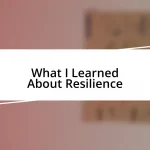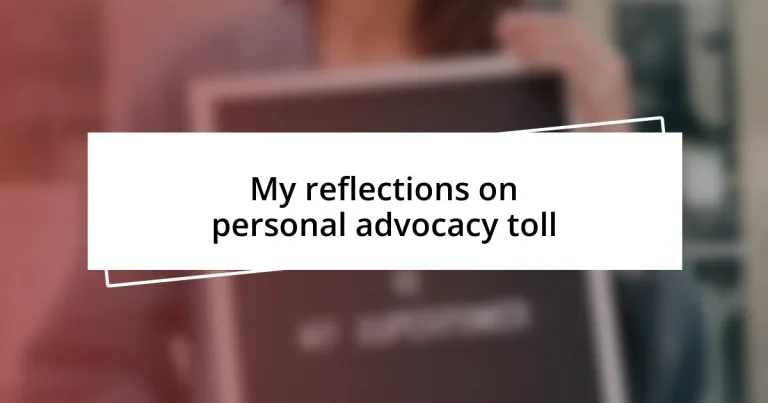Key takeaways:
- Personal advocacy can lead to emotional exhaustion and isolation, emphasizing the need for self-care and recognition of one’s limits.
- Setting clear boundaries and prioritizing personal needs are essential strategies to maintain balance and prevent burnout.
- Building a support network offers emotional relief and encouragement, reinforcing that advocates are not alone in their struggles.
- Reflecting on personal growth encourages viewing challenges as opportunities and embracing vulnerability as a strength in advocacy.
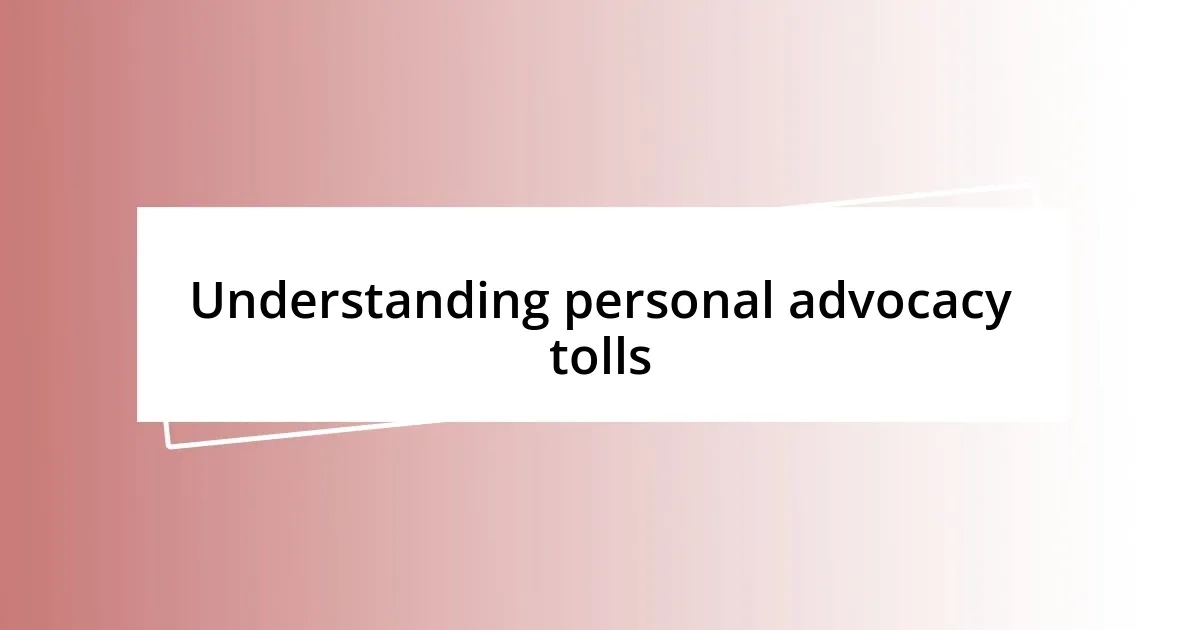
Understanding personal advocacy tolls
Understanding personal advocacy tolls can feel overwhelming at times. I remember a period in my life when I was heavily involved in advocating for a family member’s health decisions. It was a constant battle of navigating complex medical jargon and the emotional weight of their condition. Reflecting on it now, I realize how draining that experience was, not just mentally but also emotionally. Have you ever felt that exhaustion from fighting for someone else?
When we talk about the toll of personal advocacy, it’s essential to recognize the invisible costs—stress, anxiety, and even moments of isolation. There were days when I felt like I was shouting into a void, battling not just healthcare systems but also my own fatigue. I often asked myself if my efforts were making a difference. Eventually, that self-doubt created a heavy burden on my spirit.
Moreover, the emotional rollercoaster that comes with personal advocacy shouldn’t be underestimated. I think about the moments of joy when a small victory was achieved, only to be followed by the deep frustration of setbacks. It’s a cycle that can lead to burnout, prompting us to question our own needs. Balancing the fight for others with self-care is not just a concept; it’s a necessity. How do we find that balance while staying true to our advocacy?
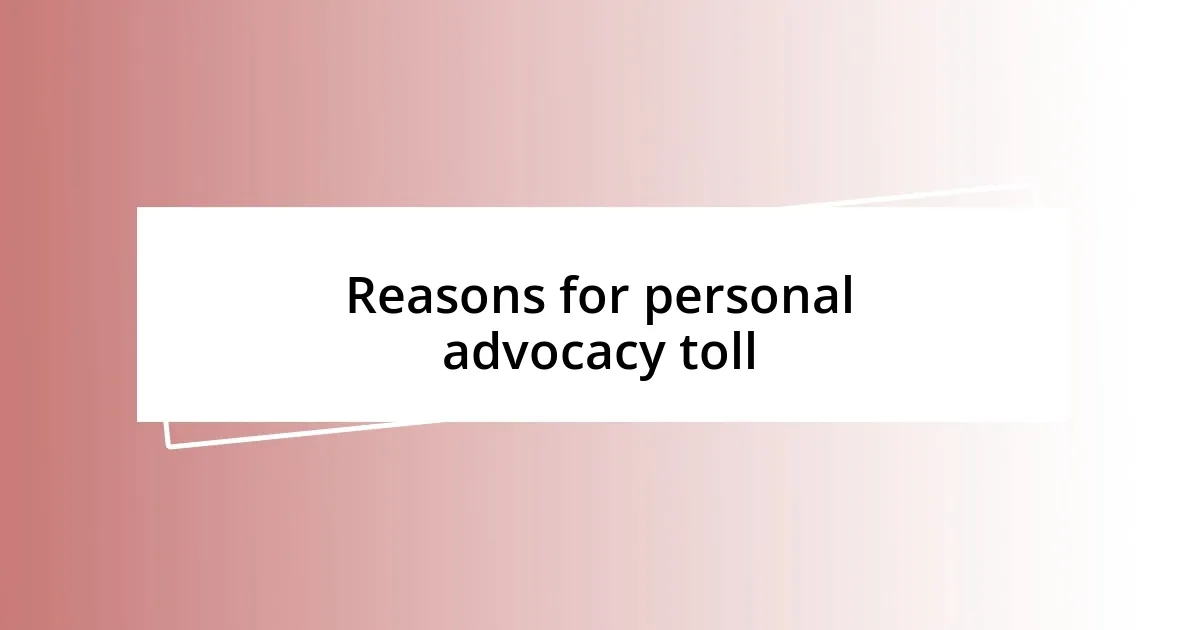
Reasons for personal advocacy toll
The reasons behind the personal advocacy toll are multifaceted and can differ significantly from one person to another. I often found myself grappling with feelings of responsibility, as if my own well-being was secondary to my loved one’s needs. This sense of obligation can be a heavy weight to carry, leading to emotional exhaustion and detachment from one’s own life. It’s almost as if the role of an advocate becomes all-consuming, leaving little room for self-reflection or respite.
- Overwhelming Responsibility: The pressure to be the voice for someone else can overshadow personal needs.
- Emotional Weariness: Constantly fluctuating between hope and disappointment can drain emotional reserves.
- Chronic Stress: Navigating healthcare systems and advocating for rights often leads to persistent anxiety.
- Isolation: Advocacy can create a sense of separation from friends and family who may not fully understand the struggle.
- Neglected Self-Care: In the midst of fighting battles for others, personal health and wellness often take a back seat.
I remember once attending a support group meeting where I shared my experiences, hoping to find solace in others’ stories. Instead, I was struck by the common thread of fatigue and bombardment we all felt. It became clear to me then: the toll isn’t just about the time and effort involved; it’s also about the emotional labor and the sacrifices made along the way. Reflecting on these struggles, I realize that recognizing and naming these challenges is the first step toward mitigating their impact.
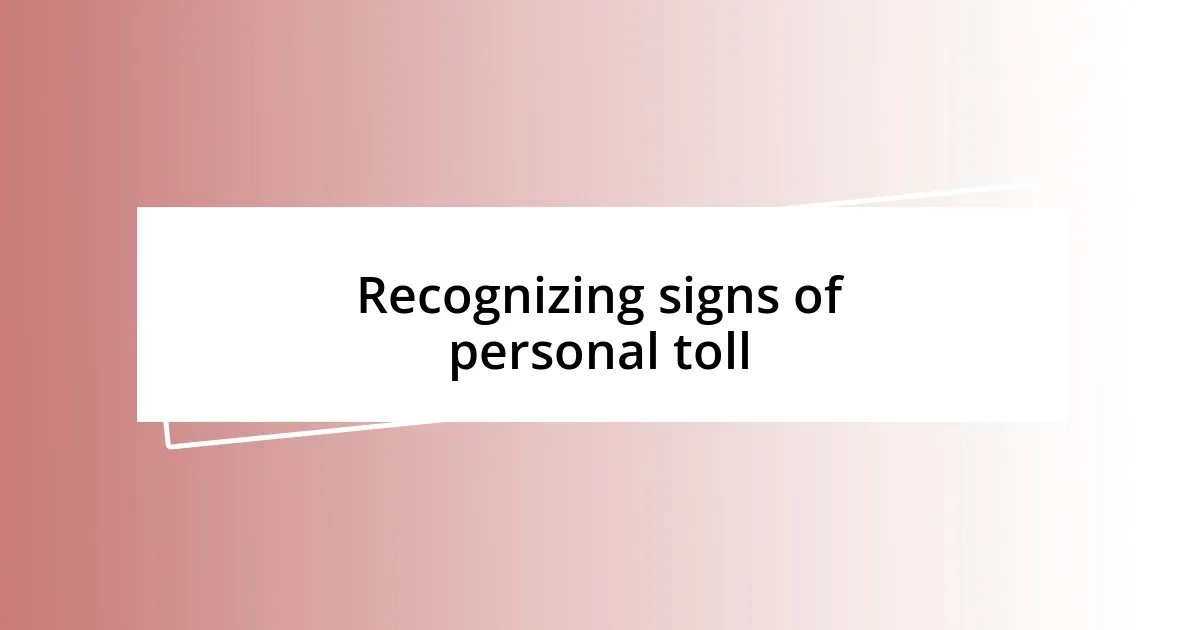
Recognizing signs of personal toll
Recognizing the signs of personal toll can be quite the experience. One day, I found myself staring blankly at my phone, unable to respond to messages from friends who were just trying to check in. I realized then that isolation had crept in silently. It felt like I was bobbing alone in an ocean of advocacy, where the waves of responsibility kept me from reaching out for support. Have you ever experienced that? It can be incredibly isolating, and that’s often the first sign that something is off.
Another telling sign I’ve noticed is the shift in my emotional landscape. I remember the mornings when I would wake up feeling a heavy fog, a mixture of dread and uncertainty about the day ahead. That emotional weariness is hard to shake off, and it can leave you questioning your capacity to keep fighting for others. Reflecting on that, I learned that being tuned in to our emotions is crucial for recognizing when the toll becomes too high.
Lastly, physical symptoms often manifest when the personal toll feels overwhelming. I can recall days when my body felt like it had forgotten what relaxation was—tight shoulders, headaches, and an ever-present fatigue. These physical signs spoke volumes about my emotional state. I’ve come to realize that paying attention to both emotional and physical cues is vital. Recognizing these signs early can be a path to taking back control before it becomes too daunting.
| Signs of Personal Toll | Descriptions |
|---|---|
| Isolation | Feeling disconnected from friends and family, often due to the overwhelming nature of advocacy. |
| Emotional Weariness | A pervasive sense of dread or fatigue that can cloud daily experiences. |
| Physical Symptoms | Manifestations like headaches or muscle tightness that reflect emotional stress. |
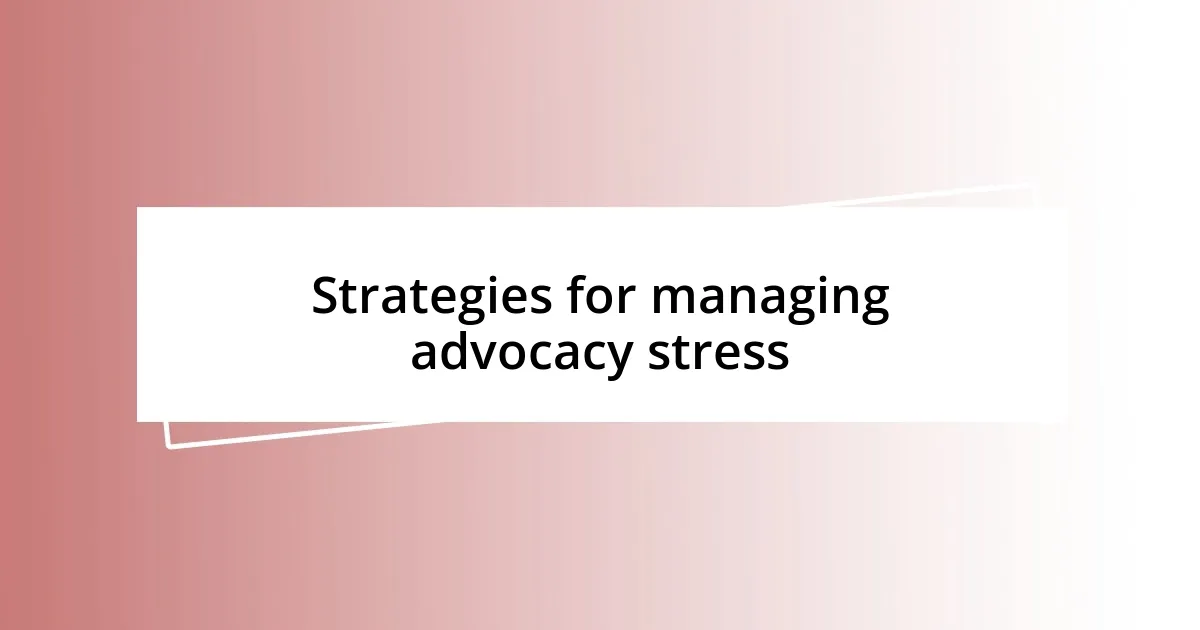
Strategies for managing advocacy stress
Finding balance while advocating for others is no small feat, and I’ve learned that implementing practical strategies is essential. One approach that has worked wonders for me is setting clear boundaries. I used to say yes to every request, believing that my support was paramount. However, I discovered that stepping back, even just for a moment, allowed me to recharge and regain my perspective. Have you ever tried prioritizing your own needs in the midst of constant demands? Trust me, it makes a world of difference.
Another strategy I often turn to is integrating regular self-care into my routine. I vividly recall a time I felt utterly drained after a week full of meetings and calls. It was a Sunday afternoon when I decided to indulge in a long bath and a good book. That simple act not only rejuvenated my spirit but also reminded me of the importance of nurturing myself. Engaging in activities that bring joy, whether it’s painting, gardening, or simply taking a walk, can be incredibly grounding. It’s amazing how taking a step away, even briefly, restores the strength we need to keep advocating.
Lastly, I’ve found that connecting with others who understand the journey can be incredibly therapeutic. I remember attending an advocacy workshop and being struck by the openness of conversation. Sharing my struggles and hearing others’ experiences offered an unexpected sense of relief. Have you ever felt lighter after voicing your worries? It’s a powerful reminder that we’re not alone in this advocacy endeavor. Joining support groups or online forums can be a lifeline, fostering connections that help alleviate the weight of advocacy stress.
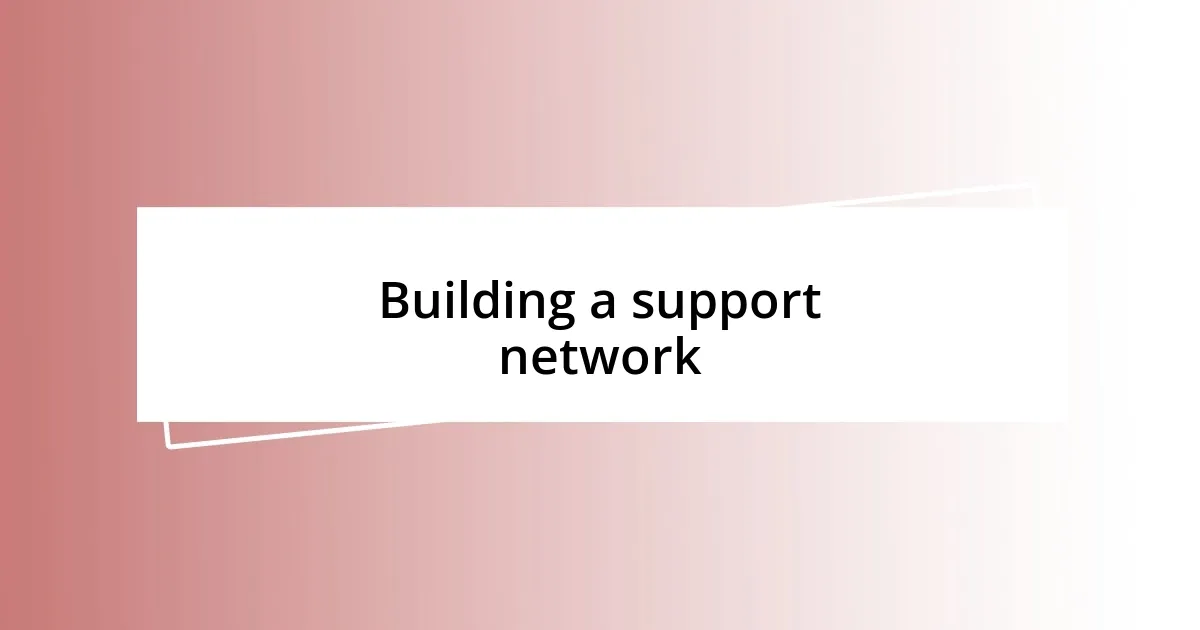
Building a support network
Building a support network has been one of my most rewarding endeavors in navigating the emotional landscape of advocacy. I remember the first time I reached out to a colleague who was also passionate about the cause. We met over coffee, and I found that sharing our stories not only lightened my heart but also deepened my understanding of the challenges we both faced. Have you ever experienced an uplifting moment just by connecting with someone who gets it? That initial conversation opened doors not just to friendship but to a broader network that provided comfort and guidance.
Engaging with a diverse group of advocates has allowed me to draw from a wealth of experiences. I recall a workshop where various voices shared their advocacy journeys. Some spoke of triumphs, while others uncovered their struggles. Listening to their narratives resonated with my own experiences, sparking a realization that we are all part of a larger community. It was a vivid reminder that our shared challenges can foster deeper relationships. Have you thought about who you could reach out to in your own network? Building that foundation is crucial for personal growth and resilience.
I’ve also learned the importance of nurturing these connections. Regular check-ins with my support group have become essential; we often exchange messages of encouragement or simply vent about our experiences. I vividly remember a week when I felt particularly overwhelmed. A simple text from a friend who understood my plight offered a breakthrough—she reminded me that “it’s okay to take a step back.” That gentle reminder to lean on others is integral to sustaining our advocacy efforts. Are you surrounding yourself with supportive individuals? Investing in your network can transform the experience and ease the toll of personal advocacy.
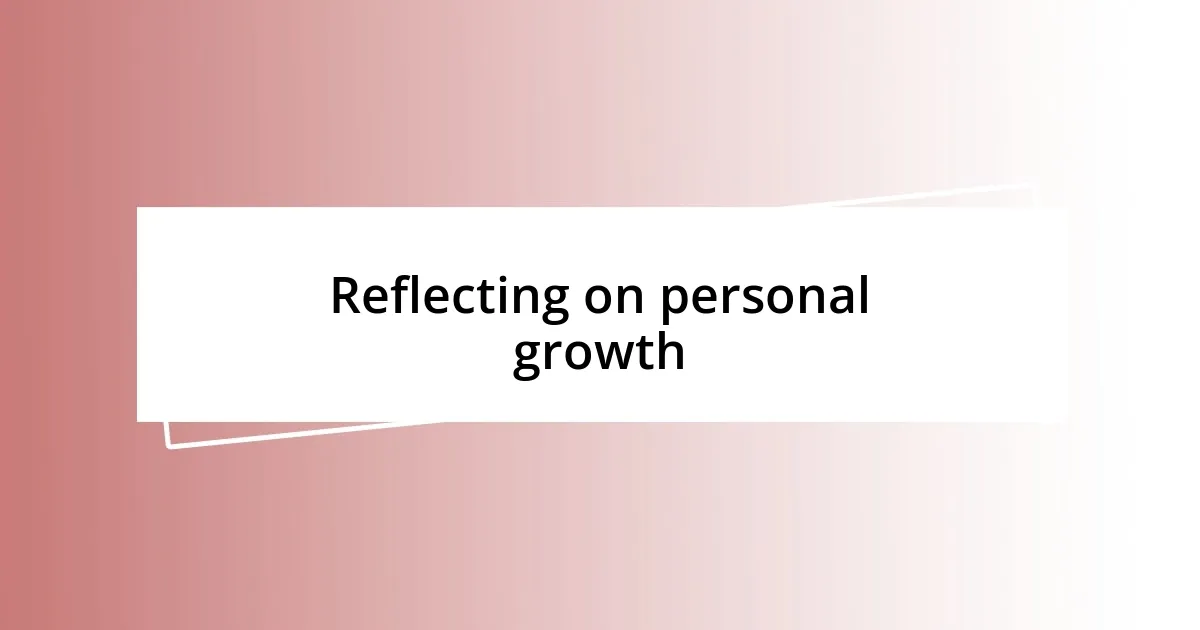
Reflecting on personal growth
Reflecting on personal growth, I’ve often found that the hardest moments can transform into the most valuable lessons. I vividly recall a time when my enthusiasm for advocacy led me to overcommit, ultimately leaving me exhausted and disheartened. It was in that fatigue that I stumbled upon a profound realization: strength lies not just in action, but in discernment. I began to explore the idea that personal growth often necessitates stepping back. Have you ever felt that pushing forward might be counterproductive? For me, it was a game changer.
In nuance lies insight, and my journey has shown me the importance of embracing vulnerability as a strength. Once, during a particularly challenging advocacy project, I chose to share my insecurities with a close friend instead of hiding them. That simple act of disclosure opened up an enlightening dialogue, and I learned that our struggles often echo in others’ experiences. Have you ever felt relief in sharing your doubts? I realized that discussing my vulnerabilities wasn’t a sign of weakness—it was an essential step toward evolving as an advocate.
Through this ongoing process of self-reflection, I’ve grasped that personal growth isn’t a linear path but a series of winding turns. Each setback I encountered turned out to be a stepping stone, leading me to deeper insights about my passions. I remember one setback that stung deeply, but looking back, it paved the way for me to elevate my advocacy work to new heights. It’s incredible how such moments can steer us toward newfound clarity. What if we saw our challenges as opportunities for growth? Embracing this perspective can enrich our advocacy journeys remarkably.
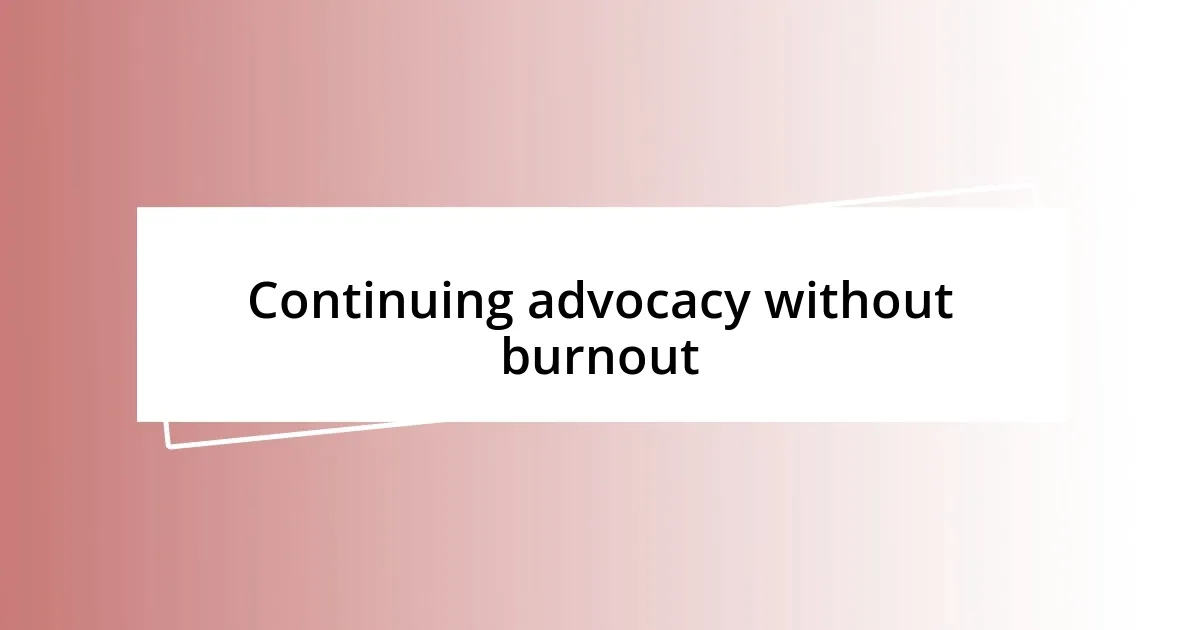
Continuing advocacy without burnout
Continuing advocacy without burnout requires mindful practices that honor our limits. I vividly remember a period where I became so entrenched in my cause that I neglected basic self-care. One evening, feeling utterly drained, I decided to take a long walk instead of diving into more work. The fresh air and gentle movement rejuvenated my spirit, highlighting the importance of stepping away to recharge. What would happen if we made space for such moments in our advocacy journey?
Incorporating regular breaks and boundaries into my routine has been invaluable. I often set specific times to disconnect from advocacy-related tasks, creating a buffer between my work and personal life. One particular weekend, I chose to unplug entirely and spend time with friends, and it turned out to be a necessary reset. I returned refreshed and filled with new ideas, underscoring how vital it is to prevent burnout by allowing ourselves the grace to relax. Have you thought about how often you give yourself permission to unplug?
I also find it helpful to shift my focus to collaborative efforts rather than solely bearing the weight of advocacy alone. I recall a project where I partnered with others who shared my vision; our shared enthusiasm made the work feel lighter and more enjoyable. The synergy we created not only expanded our impact but also reminded me that together, we are more resilient. How could you reframe your next challenge by inviting others into the fold? Embracing teamwork can be a powerful antidote to fatigue, reinforcing the truth that collective effort nourishes our advocacy spirit.
